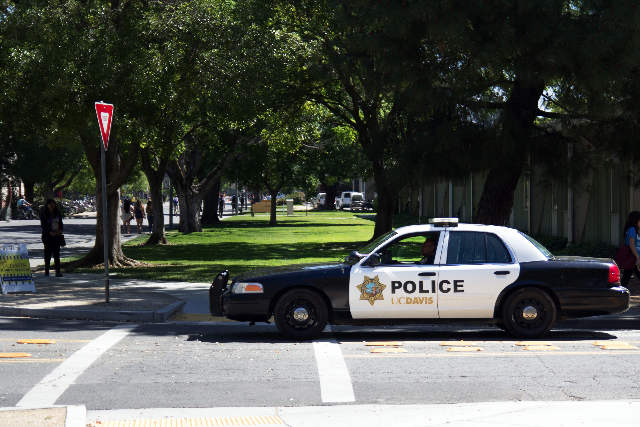Beginning in February, the UC Davis Police Department (UCDPD) began recording its traffic stops of bicycles and cars online according to age, gender and race. The records will be updated monthly and can be viewed on the UCDPD’s website.
According to Matt Carmichael, UC Davis police chief, if not noted on the subject’s driver’s license, the records will be based entirely on the working officer’s perception. While Carmichael admits that perception is not the most accurate method of recording, he argued that this method is necessary in order to prevent disrespecting people by asking them personal questions.
“This program is about respect so I want to make sure that we travel this road with a good balance which is respecting everyone we interact with out in the field versus collecting the data,” Carmichael said. “It’s a tough line to walk because it’s important data and it’s information, I can promise you, our students want to know, but at the same time we have to be conscious that it’s not intrusive.”
According to Carmichael, the idea behind the practice arose from complaints he often received that the police were profiling. In order to improve transparency, Carmichael decided to put the records online to make them more accessible.
“I’ve been here 12 years now, and in my 12 years, there have been voiced concerns from the community that we profile people who we stop,” Carmichael said. “So in the past, I’ve had the ability just to speak to it; it’s just Matt talking. But I’m a very factual driven person. So we came up with a process where we can actually capture the data.”
Kennedy Simon, a first-year sociology major, views the perception-based practice as another form of profiling.
“I do think that they should ask because it’s kind of another way that’s profiling because what if I’m really not black?” Simon said. “If they’re going to record my race, they might as well be right so might as well ask me. I would rather be asked than for them to assume.”
In addition to recording the race, gender and age of the subjects, the records will also display the amount of citations, warnings and arrests made for traffic stops. The data will be split between bicycle and car stops as well as stops in Davis and Sacramento.
Carmichael said that margin of error will be taken into account. In the case that officers forget to advise the dispatch center of this information, they will be prompted by the dispatch to record the information or be asked for it by the crime analyst towards the end of the month. If the officer cannot remember the specific account, the online record will note for incomplete or partial data.
According to Carmichael, there will also be an unknown section if the officer cannot identify the subject’s race or gender.
Kelsey Stewart, a first-year psychology major, questioned the accuracy of recording police data entirely by perception.
“I think they should ask them what their race is because people appear to be one thing, but they could really appear to be other things,” Stewart said. “For example, people could be Mexican, but they look white. They should definitely ask because it’ll be more accurate.”
The new traffic stop practice is among several new inclusions to the UCDPD’s updated website. Other additions include navigation to the Student Advisory Council, the Chaplain Program, a parent/guardian corner and a link to a Know Your Rights information page written by the American Civil Liberties Union.
“Another thing I always hear about on-campus is our students are always curious about [what] their rights are,” Carmichael said. “This is really good information for international students who may not be familiar with the particular information of the police practice here.”
However, student reactions to the new practice have been fairly negative. Many worry of the statistical inaccuracy of recording by perception.
“To be honest, I respect data coming from a science major, but also, I think nowadays it is hard to make an assumption,” said Nicole Cotes, a first-year neurobiology, physiology and behavior major. “Because what if you’re wrong about the assumption? Then your data isn’t going to be as valid.”
Cassandra Rios, a first-year, views the practice as problematic due to the large number of people who are of mixed race and may be mistaken for the wrong race.
“I would say that’s wrong of them to assume because so many people are mixed nowadays,” Rios said. “Why would you make an assumption? It wouldn’t be as conclusive as if you just asked the person what race.”
According to Carmichael, there is room for the practice to be tweaked. He urges students who have any questions or concerns about the service to voice them directly to him. Because the practice arose out of community concerns, Carmichael contended that feedback is vital to effective policing.
“I always knew policy was important to the operations of the police department, but there’s another reader out there and students really help me to see that that other reader is the community,” Carmichael said.
JASON PHAM can be reached at campus@theaggie.org.
Photo by Rousseau Gleitsman.




